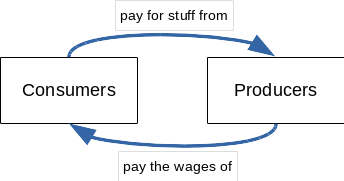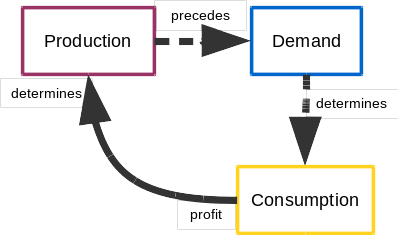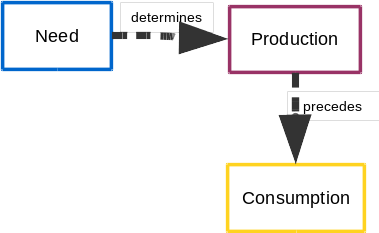Abolish Money? How Naïve!
Dad/Mom, where does your money come from?
From our employers!
And where does their money come from?
From us!
How cute - they must think that this shuffling of money from employers to people and back again is a pointless waste of energy. After all, what’s the point of swapping for the same thing? Here you go, have my apple! Here you are, take mine in return! Now we both have an apple, which is exactly how we started! What a fun game!

Of course, as you’ll understand “when you’re older”, this isn’t a game at all. If you don’t have money, you can’t get toys, and this forces you to work in toy factories to produce them and earn money. Those who don’t can end up with no toys at all.
But why can’t they buy toys?
Because they don’t have money.
But why can’t they make their own toys?
Because they don’t have money!
As you see from the diagram, there is a vicious circle: consumers need money to consume and producers need money to produce. So how does the process get started at all? For millions of people, it simply doesn’t. This is often referred to as the ‘poverty trap’. However, in rich parts of the world, there are people with lots of ‘extra money’ which they can use to get the process started, knowing that there are consumers who have the money to buy what they’ve produced. This ‘extra money’ is known as ‘capital’.
The department store
Now we’re in a big department store brimming with shiny toys, assorted contraptions and a variety of vibrant victuals.
Look! I know you have to pay for things to be produced. But this stuff has already been produced! Somebody must have already paid for it. Surely we can just take it?
Superficially it sounds like a solution to the aforementioned poverty trap - if only they had department stores within easy reach - but no, no, no, this is called stealing. And everyone knows that stealing is a moral obscenity. That’s why all the goods in the department store are protected by security tags, security checkpoints, security personnel, security grilles, security pads, CCTV cameras, and of course, the price tags, cashiers, checkout lanes, barcode scanners and cash registers you have to get through - and if none of that works they can always call the police.
What the naïve mind fails to understand is that most of the time in the money world, instead of paying people to produce something, you produce something and then expect people to pay for it afterwards. Of course, this leads to the minor inconvenience that you can never be quite sure how many people will actually buy the stuff that you’ve produced, or even whether anybody wanted it in the first place. This mystical, unpredictable quantity is known as the ‘demand’. The history of capitalism - I mean, toy-making - is replete with examples of commercial failures.
When people don’t buy toys, toy-makers may lose so much money that they have to shut down completely! And this can often cause a ripple effect across all kinds of producers, with people losing money all over the place, and that just makes the problem even worse! Unsurprisingly this is called a ‘depression’, and makes everyone very sad. That’s why it’s important to buy lots and lots of toys, regardless of how good they are.
And to do that, we have to make sure that everyone gets richer and richer, so that they can buy more toys and so that more and more toys can be produced. In the future, the world will be covered thick with toys - and it will be so much fun!
(You don’t need to worry about where all that plastic will come from: clever people always find a way around these minor limitations.)
“Those who don’t work don’t eat.”
As we discovered, stealing is cheating. Even if it’s food or water we’re talking about, it’s illegal to take what you need. Hence the expression, ‘to earn a living’.
What do you mean you can’t live unless you work? How can you work unless you live?
Again, this quaint misunderstanding fails to appreciate that the grown-up world is based on hard work, responsibility and consequences. Poverty and in some cases death are of course the only reasonable, civilised ways to deal with people who don’t work hard to produce as many toys as they possibly can.
But why do you have to be forced into it? Surely we all want toys. We could get together, produce some toys and then we’d get to play with them afterwards…
Of course, this juvenile objection fails to account for the danger of ‘free riders’. In the real world, people are rewarded in proportion to the amount that they earn by hard work. Everyone agrees with this principle. For example, when you cook a meal - say, a big pot of pasta - the portion sizes are always proportional to how much work people contributed in the kitchen. “Those who don’t work, don’t eat” remember? Your parents get the most, because they did most of the work; you get a small portion because you laid the table; grandma gets nothing, because she was in bed; and your 17 year-old brother who’s just walked through the door also gets nothing because he wasn’t even there. If there’s any pasta left over, then of course it has to be thrown away, because we can’t have people stealing things that they haven’t earned.
Taking stock
Now let’s take stock of the important lessons we’ve learned so far. Firstly, production depends on there being ‘extra money’ available (capital) to get the process started. (That’s why poor people can’t do this, remember?) Secondly, the demand for a product is only discovered after it’s already been produced, by working out how many people resisted the urge to steal and actually paid for the things that had been produced. And once these two steps have happened - production and demand - you can finally go home with your toys and play! The posh word for this is ‘consumption’.
So that even more toys can be produced next time, some extra money needs to be generated. This is called ‘profit’. The profit cycles back to the production stage, and the whole process repeats! We can draw a little diagram to make it clearer:

It’s all backwards!
It seems like our naïve protagonist thinks we’ve got it all backwards. They seem to think that you should live before you work, that production should be for need, rather than for sale and that production should not depend on its own output (capital), like a snake eating its own tail.
Let’s entertain these ideas for a moment and draw a diagram of that crazy, unworkable nonsense.

See how we swapped the blue and purple boxes around, and removed the arrow that comes from the yellow box?
You begin with a desire, a need, a wish, or a goal, and then you realise that goal and make it real. You collaborate to produce the things that you collectively need, then distribute them to where they are needed so that they can be consumed by the people who need them. Rinse and repeat. Well now that’s just idealistic utopian fantasy, right?

